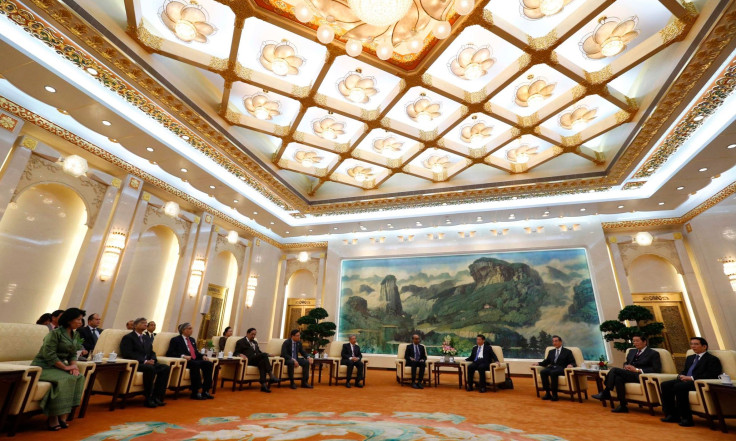China Welcomes Iran, UAE To Asian Infrastructure Investment Bank; Founding Members Now Number 35

North Korean is out, but Iran is in. China’s Ministry of Finance said Tuesday the Islamic republic will join the United Arab Emirates in becoming founding member states of the Asian Infrastructure Investment Bank (AIIB).
The $50 billion international financial institution, which is based in Beijing, aims to finance infrastructure projects in developing Asian nations but is viewed suspiciously by the U.S. despite strong interest by its major Western allies.
“Up to now, the founding members of the Asian investment bank has increased to 35,” the ministry said in a statement Tuesday announcing the inclusion of Iran and the UAE. More than 50 countries have applied for membership.
Last week China ruled out membership of North Korea, citing a lack of transparency about how it would use AIIB funds. China routinely loans money to its authoritarian ally in exchange for uranium and other mineral ores.
Iran's inclusion in the new development bank is the second time this month the nation has moved toward improving its international image, wracked for years by its controversial and secretive nuclear program that has riled the United Nations and regional foes Israel and Saudi Arabia. On Thursday, world powers and Iran agreed to the Joint Comprehensive Plan of Action, which would lift Iran sanctions in exchange for verifiable restrictions to its nuclear program.
Both the World Bank and International Monetary Fund have 188 member states and are based in Washington, D.C. The smaller Asian Development Bank , which is based in Manila, boasts 67 members. All three of these multinational lenders have welcomed the AIIB and pledged to work to work with it.
Both the U.S. and Japan, which has a distrustful relationship with China, have kept quiet about joining the AIIB. Last week the U.K. said it was joining, and France, Germany and Italy have applied for membership.
Like the World Bank and others, AIIB member states plan to pool funds to lend to countries for projects like building roads and hydroelectric dams. Development banks are aimed at spurring transnational business deals while also installing needed infrastructure in poorer countries.
But critics have said the conditions imposed on borrowing countries often involve forcing trade liberalization and deregulation and can lead to cuts in social spending in poorer countries as their debts to the development banks grow.
In the controversial 2004 book “Confessions of an Economic Hitman” former engineering consultant John Perkins says development loans are often used to drum up business for multinational companies. Perkins said his job was to convince political and economic leaders in developing countries, like Indonesia and Ecuador, to borrow money from the World Bank and the U.S. Agency for International Development for projects of questionable value to the communities they ostensibly serve.
As of Tuesday the following nations have become AIIB founding members: Bangladesh, Brunei, Cambodia, China, France, Germany, India, Indonesia, Iran, Italy, Jordan, Kazakhstan, Kuwait, Laos, Luxembourg, Maldives, Malaysia, Mongolia, Myanmar, Nepal, New Zealand, Oman, Pakistan, Philippines, Qatar, Saudi Arabia, Singapore, Sri Lanka, Switzerland, Tajikistan, Thailand, United Arab Emirates, United Kingdom, Uzbekistan and Vietnam.
© Copyright IBTimes 2025. All rights reserved.






















